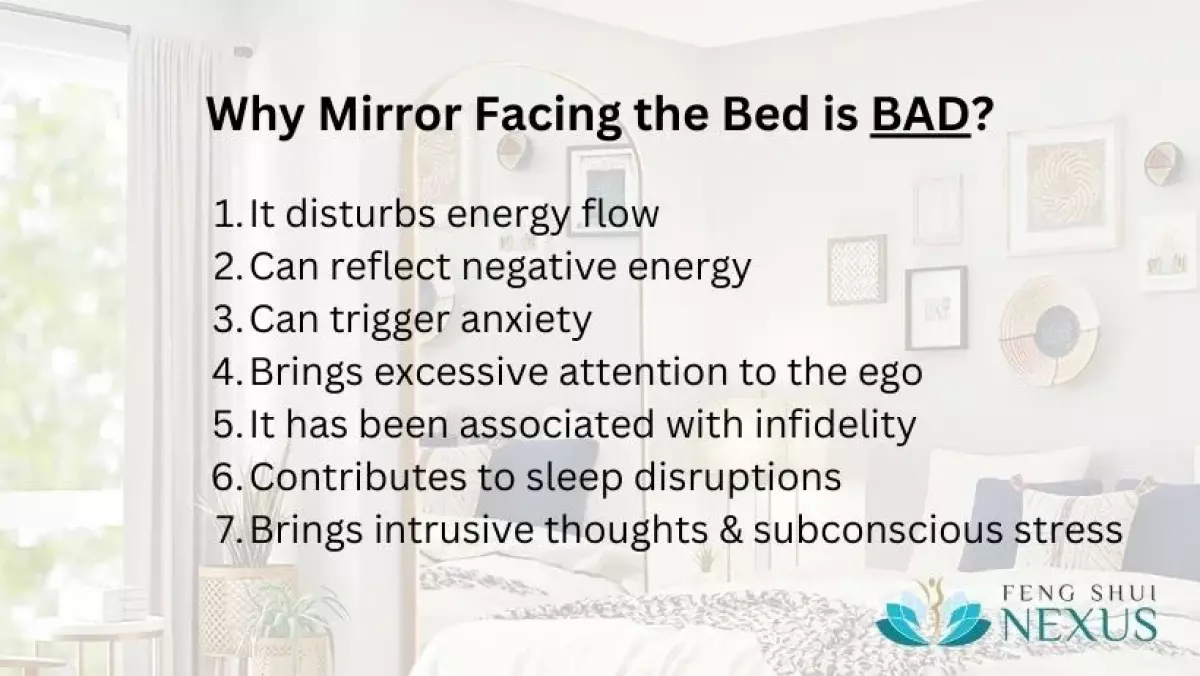 picture: Illustration of a bedroom with a mirror facing the bed.
picture: Illustration of a bedroom with a mirror facing the bed.
Have you ever considered the placement of your mirror in your bedroom? It turns out that having a mirror facing your bed might not be the best idea. In this article, we will explore the reasons why mirrors in the bedroom can disrupt your sleep and impact your overall well-being.
A Feng Shui Perspective
Feng shui, an ancient Chinese practice focused on the balance of energy, or "chi," warns against having mirrors facing the bed. According to feng shui principles, here are some reasons to consider:
Disturbed Energy Flow
Feng shui emphasizes the importance of a balanced and harmonious flow of energy within a room. When a mirror faces the bed, it creates a constant reflection and redirection of energy, which can lead to restlessness and unease, making it difficult to achieve a good night's sleep.
Reflection of Negative Energy
Mirrors are believed to capture and hold onto energy, including negative emotions and thoughts. When a mirror faces the bed, it reflects these negative energies back to the sleeper, potentially causing disturbed sleep and unsettling dreams.
Increased Stress and Anxiety
Some feng shui practitioners suggest that having a mirror in the bedroom can increase stress and anxiety. The feeling of being watched or observed during sleep can create a sense of unease, making it challenging to relax and fall asleep.
Vanity Overdose!
In certain feng shui beliefs, having a mirror facing the bed is seen as encouraging excessive attention to one's ego and physical appearance. Constantly fixating on outer image can overshadow deeper introspection and personal growth, affecting one's journey towards self-improvement.
Can Encourage Infidelity
Another intriguing aspect of having a mirror facing the bed is the belief that it can introduce a third-party dynamic into a couple's relationship. According to feng shui principles, the mirror's reflective power amplifies the energy and luck of those in its vicinity, potentially affecting aspects related to romance. This intensified energy may unconsciously be interpreted as an encouragement for infidelity.
While these perspectives might not have a scientific basis, they highlight the cultural and symbolic significance mirrors can hold in personal relationships.
What Does Science Say?
Scientifically, having a mirror facing the bed might not be ideal for several reasons:
Distraction and Anxiety
A mirror facing the bed can be profoundly distracting, especially if it reflects other objects or lights in the room. This distraction can impact your ability to relax and fall asleep, potentially leading to feelings of anxiety and restlessness.
Sleep Disruptions
Mirrors that reflect light in the bedroom can amplify nighttime illumination, potentially disrupting your sleep patterns. Studies have shown that exposure to artificial blue light, similar to natural daylight, can suppress the production of melatonin, a hormone responsible for regulating sleep-wake cycles.
Negative Body Image
For some individuals, the presence of a mirror facing the bed can intensify feelings of negative body image, heightening self-consciousness about their appearance. This heightened self-awareness can generate emotional distress, making it difficult to achieve the mental relaxation required for a peaceful night's sleep.
Intrusive Thoughts & Subconscious Stress
The reflective surface of a mirror can sometimes lead to intrusive thoughts or self-reflection, especially when dealing with stress or anxiety. These thoughts can keep your mind active when it should be winding down for sleep. Additionally, mirrors have the potential to evoke subconscious stress or fear responses, significantly affecting your ability to relax and peacefully drift off to sleep.
Hallucinations
In dimly lit settings, even without a mirror facing your bed, a peculiar phenomenon sheds light on the unsettling nature of such mirror placement. Participants in a psychological experiment reported strange visual distortions and hallucinations when gazing at their own reflection for extended periods.
Feng Shui Tips for Mirror Placement in Your Bedroom
If you choose to incorporate mirrors into your bedroom, it's essential to do so thoughtfully to promote a harmonious and restful environment. Here are some feng shui guidelines for mirror placement:
- Choose smaller mirrors or mirrored furniture pieces that don't reflect the bed.
- Place mirrors in areas where they serve practical purposes, such as on closet or wardrobe doors, or near the bedroom entrance.
- Consider placing a mirror on a wall that doesn't reflect the bed to create a sense of spaciousness.
- Reflect natural light from a window to brighten the room, but be mindful of unwanted reflections.
- Choose mirrors with frames that complement the bedroom's decor.
- Keep mirrors clean and clear to maintain their energy and clarity.
Word of Advice
Ultimately, the decision to have a mirror facing your bed depends on your personal feelings and beliefs. While feng shui and scientific research provide reasons to be cautious, everyone is unique. Pay attention to how your bedroom setup affects your sleep and feelings. If a mirror is causing problems, consider moving it or covering it and observe any improvements.
In conclusion, mirrors facing the bed can disrupt your sleep and impact your overall well-being. Whether you choose to follow feng shui principles or scientific insights, it's crucial to create a bedroom environment that promotes relaxation and tranquility. So, take a moment to assess your mirror placement and create a space that supports restful slumber.

















